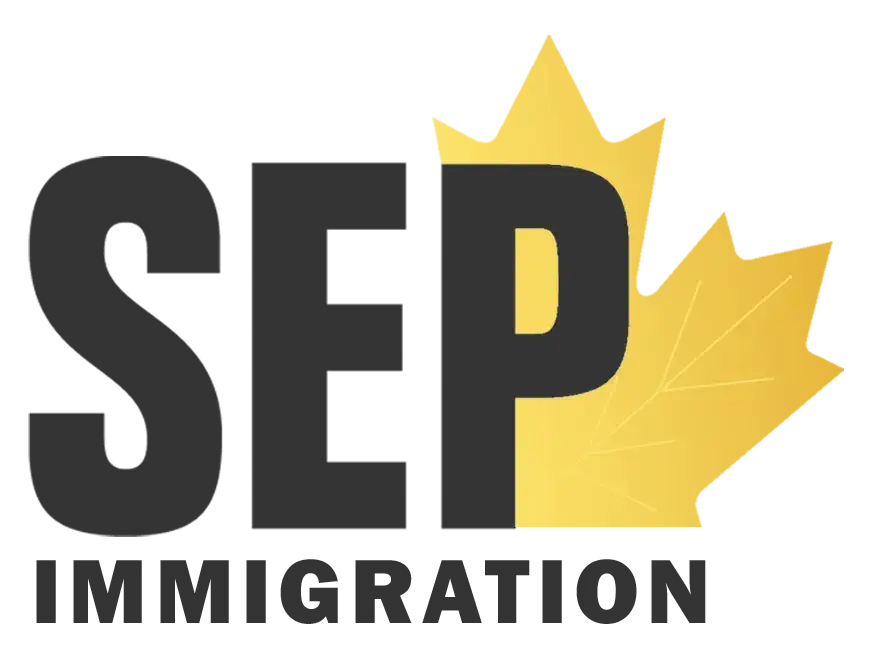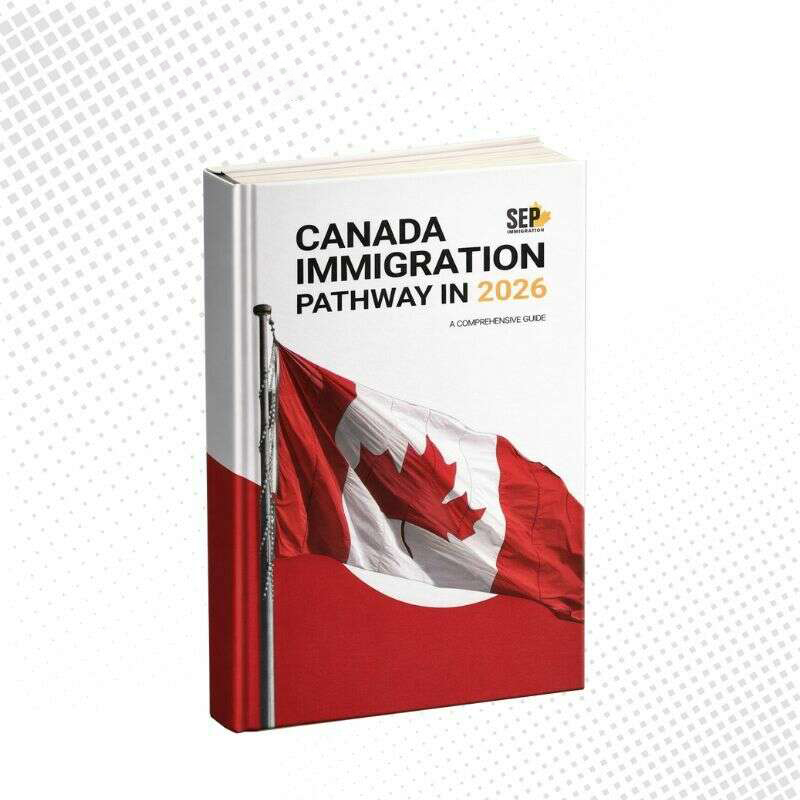
Express Entry is Canada’s online system for managing immigration applications from skilled workers. It covers three main programs: the Canadian Experience Class, the Federal Skilled Worker Program, and the Federal Skilled Trades Program. If you’re aiming to become a permanent resident of Canada, this is the path to explore.
Table of Contents
ToggleWhat is Canada Express Entry?
Express Entry is Canada’s system to manage applications from skilled workers seeking permanent residence. It includes the Canadian Experience Class, Federal Skilled Worker Program, and Federal Skilled Trades Program. If you’re eligible, you could also apply for a Provincial Nominee Program to boost your chances.
How to Apply to Express Entry Canada (Step-by-Step)
- Check Your Eligibility: Use the online tools to see if you qualify for any of the programs.
- Calculate Your CRS Score: Estimate your score using the CRS tool.
- Gather Documents: Get your language tests, work experience proof, and other required documents.
- Create Your Profile: Fill out the online profile to enter the pool of candidates.
- Receive an Invitation: If your score is high enough, you’ll get an Invitation to Apply (ITA).
- Submit Your Application: Complete and submit your application within 60 days.
Express Entry Eligibility
To be eligible for Express Entry, you must qualify under one of these programs:
- Canadian Experience Class: For those with recent Canadian work experience
- Federal Skilled Worker Program: For workers with foreign or Canadian experience who meet education and other criteria.
- Federal Skilled Trades Program: For qualified tradespeople with a job offer or certificate of qualification.

Express Entry Requirements
You’ll need:
- Language test results (IELTS, TEF, etc.)
- Proof of work experience
- Educational credentials (with an Educational Credential Assessment if outside Canada)
- A valid passport
- Additional documents as per the program requirements
Canada Express Entry Fee
The fees for Express Entry are:
- Main applicant: $1,525 CAD (including the right of permanent residence fee)
- Spouse/partner: $1,525 CAD
- Dependent child: $260 CAD per child
You may also need to pay biometrics fees, which cover fingerprinting and a digital photo.
Canada Express Entry Application
Canada’s Express Entry system is the main way skilled workers can apply for PR in Canada. It includes three federal programs. Each program has its own rules, but all look at work experience, education, language ability, and proof of funds. Your work must fall under NOC TEER 0, 1, 2, or 3. Language tests are required for all applicants. If you studied outside Canada, you’ll need an Educational Credential Assessment (ECA).
After creating a profile, you get a Comprehensive Ranking System (CRS) score. The CRS score is based on factors like age, education, and job history. Invitations to apply (ITA) go to top-scoring candidates.
If you’re invited, you have 60 days to apply. A provincial nomination adds 600 points to your score. This significantly increases your chance of getting an ITA. Most applications are processed in six months. If approved, you’ll receive a COPR and possibly a permanent resident visa. Bring these when you land in Canada.
Your ITA Options: Accepting / Declining / Expiration
When you receive an Invitation to Apply (ITA) in the Express Entry system, you have 60 days to make a decision. Accepting the ITA requires you to submit your application for permanent residence. Declining the ITA won’t penalize you, and you can remain in the pool to receive future invitations.
However, if you don’t respond within the 60-day window, the ITA will automatically expire, and your profile will be removed from the pool. It’s critical to evaluate your CRS score and readiness before accepting an ITA, as missing information can lead to rejection later.

After an ITA Is Received, How Much Does It Cost to Submit an Application for Permanent Residence (eAPR)?
After receiving an ITA, you will need to pay the processing fee of around $825 for the principal applicant. Additionally, the Right of Permanent Residence Fee (RPRF) of $500 must also be paid. For those applying with family members, the cost increases as each dependent adds additional fees.
Beyond the government fees, applicants might also incur costs for medical exams, police certificates, language tests, and biometrics. It’s essential to budget for these expenses ahead of time, as failing to pay the required fees will result in delays or even cancellation of your application.
What Happens After an eAPR Has Been Submitted?
Once an eAPR has been submitted, your application is reviewed by IRCC officers. This involves verifying your documents, such as proof of employment, educational credentials, and language test results. Background checks are conducted to ensure you meet all eligibility requirements.
If everything is in order, you’ll receive a Confirmation of Permanent Residence (COPR). This document allows you to enter Canada as a permanent resident. If additional documents are needed or if issues arise, IRCC will contact you to resolve them. Processing times generally range from six to twelve months, depending on the complexity of your case.
Once an eAPR Has Been Submitted, Can the Applicant Travel?

Yes, applicants can usually travel after submitting their eAPR, but they need to ensure their temporary resident status remains valid. If you leave Canada while your application is in process, you must meet the entry requirements upon your return. It’s advisable to keep your status and documents up to date to avoid complications during re-entry.
Traveling doesn’t negatively impact the processing of your eAPR unless IRCC requests additional documents or biometrics, which may require your presence in Canada. Always check for any updates from IRCC regarding your case before planning travel.
For those with a work permit that’s about to run out, applying for a Bridging Open Work Permit (BOWP) can be a good idea. This permit lets you keep working in Canada while waiting for a decision on your permanent residency. It also helps avoid complications when re-entering the country. Not everyone qualifies, though—you need to have a valid work permit when applying.
Travel itself won’t affect your application, but IRCC might request documents or biometrics while you’re away. If that happens, you may need to return quickly, so it’s a good idea to check for updates regularly. Some applicants also run into issues at the border if officers think they don’t have strong enough ties to Canada. Keeping proof of employment, a lease, or other commitments can help.
If you’re planning to leave, make sure you have everything in order before booking a flight. A bit of preparation can save you from lots of headaches later.
Once an eAPR Has Been Submitted, Can the Applicant Apply for a Canadian Work Permit?
After submitting an eAPR, you may be eligible to apply for a Bridging Open Work Permit (BOWP) if your current work permit is about to expire. The BOWP allows applicants to continue working while their permanent residence application is processed. However, to qualify, you must already have a valid work permit and meet certain conditions.
This work permit is especially useful for applicants waiting for their permanent residency decision but needing to maintain employment. It helps ensure that your status in Canada remains valid during the waiting period.
All Things About Score for Canada Express Entry
The Comprehensive Ranking System (CRS) scores candidates based on:
- Core Factors: Age, education, language skills, and work experience.
- Spouse Factors: Your spouse’s education, language skills, and Canadian work experience.
- Skill Transferability: Combines education, foreign work experience, and Canadian work experience.
- Additional Points: For things like a provincial nomination, a job offer, or French language skills.
The maximum score is 1,200 points.
How to Catch Scores Canada Express Entry

To boost your CRS score:
- Get a Provincial Nomination: Worth 600 points.
- Improve Your Language Skills: Achieving Canadian Language Benchmark (CLB) 9 can significantly increase your score.
- Secure a Job Offer: Worth up to 200 points.
- Upgrade Your Education: More points for higher education levels, especially from a Canadian institution.
- Increase Work Experience: Canadian experience earns more points; update your profile regularly.
Understanding the Comprehensive Ranking System (CRS)

What Is the CRS?
- Age: Younger candidates earn more points because they have more years to contribute to the workforce. You’re in the sweet spot if you’re between 20 and 29.
- Education: Higher levels of education, especially degrees earned in Canada, score higher. If you’ve completed a master’s or PhD, that’s a big advantage.
- Language Skills: Your ability to speak, read, write, and understand English or French is crucial. Scoring a Canadian Language Benchmark (CLB) 9 or higher can give you a significant boost.
- Work Experience: The longer you’ve worked, especially in skilled jobs, the more points you get. Canadian experience scores higher than foreign experience.
- A Provincial Nomination: Adds a whopping 600 points, almost guaranteeing an ITA.
- A Valid Job Offer: Scores up to 200 points.
- French Language Skills: Even if French isn’t your first language, a strong score on a French test can make a difference.
- Canadian Education: If you’ve studied in Canada, you’ll earn extra points for your degree or diploma.
Send us an Email
Provincial Nominee Programs (PNPs) and Express Entry
- You create an Express Entry profile.
- Provinces review the pool of candidates and look for people who match their specific criteria.
- If you meet their needs, they may invite you to apply for a provincial nomination.
- If you get nominated, it’s like hitting the jackpot. A nomination adds 600 points to your CRS score. Considering the total CRS score is 1,200, that boost almost guarantees you’ll get an Invitation to Apply (ITA) in the next draw.
Types of PNP Streams
- Ontario Immigrant Nominee Program (OINP): Popular with tech workers and French-speaking professionals.
- British Columbia PNP (BCPNP): Great for tech talent, healthcare workers, and international graduates.
- Alberta Immigrant Nominee Program (AINP): Focuses on skilled workers with ties to Alberta or in-demand occupations.
- Manitoba PNP: Prioritizes people with family or work connections in Manitoba.
- Atlantic Provinces: These smaller provinces often look for workers in healthcare, trades, and other high-demand fields.

How to Increase Your Chances of Getting a PNP Nomination
- Check Provincial Requirements: Each province has its own rules. Research what they’re looking for and see if you qualify.
- Express Interest: Some provinces let you submit an Expression of Interest (EOI), showing you’re serious about moving there.
- Work in the Province: If you’re already working in a province, you might have a better shot at getting nominated.
- Study in Canada: Graduates from Canadian institutions often get priority in provincial programs.
Common Mistakes to Avoid in Your Express Entry Application
- Educational Credential Assessment (ECA) for foreign degrees.
- Proof of work experience, such as letters from employers.
- Valid passport and any additional documents specific to your program.
- Prepare these in advance so you’re not scrambling when deadlines approach.

Express Entry vs. Other Canadian Immigration Pathways
What Makes Express Entry Unique
- Points-Based System: Your profile is ranked against others using the Comprehensive Ranking System (CRS). High scores get Invitations to Apply (ITAs).
- Multiple Programs in One: Express Entry manages three programs—the Canadian Experience Class, the Federal Skilled Worker Program, and the Federal Skilled Trades Program. Each has specific eligibility requirements but operates under the same system.
- Faster Processing: Express Entry applications are typically processed within six months after you submit all required documents.
- No CRS Score Required: You don’t need to compete in a pool or worry about points.
- Relationship-Based: Eligibility depends on your family ties, not your work or educational background.
- Processing Times: While Express Entry is quicker, family sponsorship timelines can vary, often taking a year or more.
- Provincial Focus: PNPs are tailored to specific provinces, whereas Express Entry covers all of Canada.
- Lower CRS Scores: Even candidates with lower CRS scores can succeed if a province nominates them.
- Flexibility: Some PNPs focus on in-demand jobs or connections to the province, which might not matter as much in Express Entry.
- Focus on Business: Your business plan and entrepreneurial potential are the key factors, not your CRS score.
- Collaborative Process: You’ll need support from a designated organization, such as a venture capital fund or business incubator.
- Specialized: This program is only suitable for those ready to launch a business in Canada.
- Eligibility: It’s not based on work experience, education, or language skills.
- Support-Based: Applications are often supported by sponsorship or government programs.
- Different Focus: This isn’t about economic immigration but about offering safety and stability.
- Step-by-Step Process: Temporary visas don’t guarantee permanent residence, but they can strengthen your application by adding Canadian experience.
- Flexibility: Allows you to live and work in Canada while building your eligibility for programs like Express Entry.
- Longer Path: Transitioning from temporary status to permanent residence often takes longer

Tips to Stand Out in the Express Entry Pool
- Research Provinces: Each province has its own immigration priorities. Look for PNPs that align with your skills and experience.
- Express Your Interest: Some provinces let you submit an Expression of Interest (EOI) directly to show you’re serious about living and working there.
- Highlight Skilled Work: Ensure the work you claim aligns with Canada’s National Occupational Classification (NOC) codes for skilled jobs.
- Update Your Profile Regularly: As you gain more experience, add it to your Express Entry profile to reflect your growing qualifications.
- Pursue a Canadian Degree or Diploma: If you’re studying or considering studying in Canada, this can give you an edge.
- Get an Educational Credential Assessment (ECA): If you studied outside Canada, ensure your qualifications are recognized by getting an ECA. Without it, you won’t earn any education points.
- Use Online Platforms: Websites like Job Bank and other job boards specifically connect employers with potential Express Entry candidates.
- Tailor Your Applications: Customize your resume and cover letter for each job to increase your chances of standing out.

- French Proficiency: Even if French isn’t your first language, achieving a strong score in a French language test like the TEF or TCF can earn you points.
- Siblings in Canada: If you have siblings who are permanent residents or citizens, you can earn extra points.
- Strong Ties to Canada: Studying or working in Canada can also make your profile more competitive.
- Double-Check Everything: Review your profile for errors or inconsistencies before submitting.
- Provide Clear Documentation: Make sure all your claims are backed by proper paperwork, whether it’s proof of work experience, test scores, or education credentials.
How Job Offers Impact Your Canada Express Entry Application
What Counts as a Valid Job Offer?
- Be in writing, specifying job duties, salary, and conditions.
- Be for a full-time, non-seasonal position that lasts at least one year.
- Be backed by a positive Labour Market Impact Assessment (LMIA) or be exempt from LMIA requirements.
- Strengthen your case when applying under specific immigration programs, like the Provincial Nominee Program (PNP).
- Provide employer support that may help with work permits if you need to stay employed while waiting for permanent residency.
- Show immigration officers that you have a stable opportunity in Canada.

The Role of Work Experience in Express Entry Points Calculation

French Language Proficiency and Its Benefits in Express Entry
Knowing French can give Express Entry candidates a real advantage. The system assigns points based on factors like age, education, work experience, and language ability. While English is the most commonly spoken language in Canada, French speakers receive extra benefits, including additional Comprehensive Ranking System (CRS) points and access to special immigration pathways.
French proficiency can add up to 50 extra CRS points, which can make a big difference in the rankings. To qualify, a candidate must score at least level 7 in all four language skills—reading, writing, listening, and speaking—on the Niveaux de compétence linguistique canadiens (NCLC) scale.
The number of points awarded depends on the candidate’s English skills as well. If English test scores are at level 4 or lower, the candidate gets 25 extra points for their French. If English is at level 5 or higher, the bonus increases to 50 points.
Canada also holds Express Entry draws that specifically target French-speaking candidates. These draws increase the chances of receiving an Invitation to Apply (ITA) for permanent residency. Unlike general draws, which focus on overall CRS scores, these specialized rounds prioritize candidates who can help strengthen Francophone communities outside of Quebec.
To prove their French proficiency, candidates must take a government-approved test. Canada accepts the Test d’évaluation de français (TEF Canada) and the Test de connaissance du français (TCF Canada). These exams measure reading, writing, listening, and speaking ability. Test results must be valid at the time of application, meaning they cannot be more than two years old.
French language skills can also open the door to category-based Express Entry invitations. In 2023, for example, Canada introduced a system that invited candidates based on specific attributes rather than just CRS scores. French speakers were among the groups selected, which meant they had a better chance of receiving an ITA.
Even outside of Express Entry, being fluent in French can make it easier to qualify for other immigration programs. Several provinces offer special pathways for French speakers, particularly in regions that want to grow their Francophone population. Ontario, for example, has a dedicated stream for French-speaking skilled workers under its Provincial Nominee Program (PNP). Other provinces, like New Brunswick and Manitoba, also give preference to French-speaking candidates in their immigration programs.
Having strong French skills can improve job opportunities as well. Bilingual candidates are in demand in many industries, especially in customer service, healthcare, and government roles. Many employers prefer or even require candidates who can work in both English and French, making bilingual applicants more competitive in the job market.
Preparing for a French language test takes time and effort. Candidates who aren’t fully fluent should consider taking formal language courses or practicing with native speakers. Online resources, mobile apps, and study guides designed for TEF and TCF exams can also help. Practicing all four language skills consistently increases the chances of scoring well on the test.
How Express Entry Profiles Are Selected in Tie-Breaker Situations
In Canada’s Express Entry system, when multiple candidates have the same Comprehensive Ranking System (CRS) score, a tie-breaking rule is used to decide who receives an Invitation to Apply (ITA). Immigration, Refugees and Citizenship Canada (IRCC) prioritize applicants based on the date and time they submit their profiles. Those who entered the pool earlier are ranked ahead of those with the same score who submitted later.
Whenever IRCC conducts an Express Entry draw, they set a minimum CRS cut-off score. If many candidates have the exact cut-off score, IRCC uses the tie-breaking rule.
The selection is based on the timestamp of when candidates submit their profiles. Those who submitted first have an advantage, while those who entered the pool later might miss out on an ITA even if their CRS score meets the cut-off.
For example, imagine the cut-off score for a particular draw is set at 431. If hundreds of candidates have a CRS score of 431, IRCC will refer to the tie-breaking rule. If the chosen tie-breaker date is April 3, 2020, at 12:56:32 UTC, only candidates who submitted their profiles before this exact time will get an ITA. Anyone who submitted later—even if they also have 431 points—will not be invited in that round.
The tie-breaking rule helps IRCC manage high numbers of applicants and ensures that profiles are reviewed in the order they were submitted. Since Express Entry is a competitive system, even small details like when a profile is submitted can impact an applicant’s chances.
One important point is that updating a profile does not change the original submission timestamp. Many candidates improve their CRS scores over time by updating their language test results, work experience, or educational credentials.
Even with these updates, their profile remains in the system under the same initial submission date. This means that improving a CRS score does not affect the candidate’s position in the tie-breaking rule.
However, if a candidate deletes their Express Entry profile and submits a new one, the system assigns a completely new timestamp. This can be a disadvantage because it moves the applicant further down the list if a tie-breaker situation arises in future draws. Unless absolutely necessary, it’s best to avoid deleting and resubmitting a profile.
Candidates should submit their profiles as early as possible once they meet the eligibility requirements. Waiting too long can reduce the chances of receiving an ITA in a draw where many applicants have the same CRS score.
Regularly updating the profile with improved credentials can also help. While it won’t change the submission date, increasing the CRS score reduces the likelihood of being caught in a tie-breaking situation. Higher scores lead to better ranking in the pool, making the tie-breaker rule less of a concern.
Understanding how submission timestamps affect Express Entry selections allows candidates to plan their applications better.
What to Expect After Submitting Your Express Entry Application
Many candidates wonder what happens next once an Express Entry application is submitted. The process involves several steps, and processing times can vary depending on different factors.
While Immigration, Refugees and Citizenship Canada (IRCC) aims to finalize most applications within six months, delays can occur depending on the volume of applications and how quickly candidates respond to requests for additional information.
After submission, the first step is to acknowledge receipt from IRCC. This confirms that the application is complete and has entered the processing queue. If biometrics are required, candidates will receive a request to submit fingerprints and a photograph at a designated collection center.
The biometrics fee should be paid at the time of application to prevent unnecessary delays. Once the request is received, applicants have 30 days to complete this step.
IRCC then begins reviewing the application. Officials check that all forms are filled out correctly and that supporting documents meet the requirements. If everything is in order, the application moves to the assessment stage, where IRCC verifies an applicant’s education, work experience, and other eligibility criteria.
If any documents are unclear or missing, IRCC may contact the applicant for additional information. Quick responses from applicants help keep the process moving forward.
Processing times depend on several factors. The completeness of an application plays a big role—mistakes or missing documents can slow things down. The number of applications in the system also affects processing speed. When IRCC receives a high volume of submissions, wait times may be longer. Some applications require more extensive background checks or security clearances, which can also extend the timeline.
Candidates can check their application status online using the IRCC status tracker. This tool provides real-time updates and helps applicants stay informed about their progress. Having access to this information can help ease uncertainty while waiting for a decision.
For those already working in Canada, a pending Express Entry application can create concerns about maintaining their legal work status. If a work permit is set to expire before a final decision is made, eligible candidates can apply for a bridging open work permit. This lets them continue working while waiting for their permanent residency approval. To qualify, the application must be submitted before the current work permit expires.
IRCC’s final decision on an application is sent through the applicant’s online account.
If approved, instructions are provided for the next steps in obtaining permanent resident status. This includes receiving a Confirmation of Permanent Residence (COPR) and preparing for entry into Canada as a new permanent resident.
If an application is refused, the candidate will not receive an ITA in that round. However, they can remain in the Express Entry pool and continue improving their CRS score by gaining more work experience, improving language test results, or obtaining a provincial nomination. If the refusal is due to missing information or an error, submitting a new profile with updated details may be necessary.
Misconceptions About Canada Express Entry That Could Delay Your Application
Many people misunderstand how Express Entry works, and these misconceptions can lead to mistakes or delays in the immigration process. Clearing up common myths can help applicants avoid unnecessary setbacks and improve their chances of receiving an Invitation to Apply (ITA) for permanent residency.
One of the major misconceptions is that anyone can apply for Express Entry. In reality, only candidates who meet the requirements of at least one of three programs—Federal Skilled Worker Program (FSWP), Federal Skilled Trades Program (FSTP), or Canadian Experience Class (CEC)—can create a profile. Each program has certain eligibility criteria that are related to work experience, education, and language skills. Without meeting these requirements, a person cannot enter the Express Entry pool.
Another myth is that submitting an Express Entry profile guarantees permanent residency. The system is competitive, and candidates are ranked based on their Comprehensive Ranking System (CRS) score. Only those with the highest scores receive ITAs when IRCC holds a draw. A profile remains valid for 12 months, but if a candidate does not receive an ITA within that time, they must submit a new one.
Some people believe a job offer is required to qualify for Express Entry. While a valid job offer can boost a CRS score, it is not mandatory. Many candidates receive ITAs based on their education, work experience, and language test scores alone. However, certain programs, like the Federal Skilled Trades Program, do require a job offer or certification in a specific trade.
Another common misunderstanding is that Express Entry is the only immigration option. While it is a popular pathway, Canada has several other programs, including Provincial Nominee Programs (PNPs), family sponsorship, and the Atlantic Immigration Program. Candidates who do not qualify for Express Entry should explore these alternative pathways to see if they meet the requirements.
Some assume language test scores don’t have a big impact on CRS rankings. In reality, strong English or French test results can significantly increase a candidate’s score. Even those who meet the minimum language requirements should consider retaking the test if they believe they can achieve higher scores. Every additional point improves the chances of receiving an ITA.
There is also a misconception that Express Entry works like a lottery. Unlike random selection systems, Express Entry ranks candidates based on their CRS scores. Those with the highest scores receive ITAs first. Since the system is merit-based, improving factors like work experience, education, and language skills can increase a candidate’s chances.
Some applicants mistakenly think they cannot update their profiles after submission. While resubmitting a profile is not necessary, candidates should update their information if they gain more work experience, complete additional education, or retake their language test. Keeping an Express Entry profile up to date ensures that it reflects the most accurate CRS score.
Many people also believe hiring an immigration consultant is necessary. While some applicants choose to seek professional help, it is not required. The Express Entry process is designed to be straightforward, and all necessary information is available on the official IRCC website. Many candidates successfully complete their applications on their own by carefully following instructions.
Another common myth is that only one spouse can create an Express Entry profile. In reality, both partners can submit profiles if they meet eligibility requirements. This increases the household’s chances of receiving an ITA. It is important to assess which spouse has the more substantial CRS score to determine who should be the principal applicant.
Finally, some believe that receiving a provincial nomination automatically guarantees permanent residency. While a nomination adds 600 CRS points and almost ensures an ITA, applicants must still meet all federal requirements and complete their application process. The nomination is a major advantage, but permanent residency is only granted after IRCC completes a final review.
FAQs
Need help with your Express Entry application?
Our experienced team is here to support you every step of the way. Contact us today to learn how we can assist you in achieving your immigration goals.
Most Express Entry applications are processed within six months or less after submission. Processing times can vary depending on the program and additional requirements.
Yes, Express Entry is a pathway to permanent residency in Canada if your application is successful and you meet all the criteria.
Eligibility comes through the Federal Skilled Worker, Canadian Experience Class, or Federal Skilled Trades programs. CRS scores assess language, education, and work experience.
A CRS score of 450 can be borderline. Recent draws often require higher numbers, but outcomes shift depending on immigration targets and the composition of the pool.
Express Entry typically moves faster. PNP offers extra points and regional pathways. The best option depends on your profile and long-term settlement plans.
Yes, you can. Many applicants succeed without one, primarily through the Federal Skilled Worker and Canadian Experience Class programs.
Proof of settlement funds is required unless exempt. For a single applicant: CAD $15,263. For four people: CAD $28,362.




